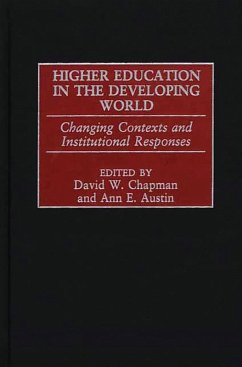Identifies five critical issues with which higher education institutions in the developing world must grapple as they respond to changing external contexts, offers examples of institutional responses to these issues, and considers these within a systems perspective which recognizes that each response impacts how institutions handle other critical issues. Half of the students enrolled in higher education worldwide live in developing countries. Yet, in many developing countries, government and education leaders express serious concerns about the ability of their colleges and universities to effectively respond to the pressures posed by changing demographics, new communication technologies, shifts in national political environments, and the increasing interconnectedness of national economies. This book identifies five critical issues with which higher education institutions in the developing world must grapple as they respond to these changing contexts: seeking a new balance in government-university relationships; coping with autonomy; managing expansion while preserving equity, raising quality, and controlling costs; addressing new pressures for accountability; and supporting academic staff in new roles. These papers offer examples of institutional responses and consider these within a systems perspective that recognizes that each response has a rippling effect impacting institutions' responses to other critical issues. Only as government and education leaders understand the interwoven nature of the problems now facing colleges and universities and the interconnections among the intended solutions they seek to implement can they offer effective leadership that strengthens the quality and improves the relevance of higher education in their countries.
Bitte wählen Sie Ihr Anliegen aus.
Rechnungen
Retourenschein anfordern
Bestellstatus
Storno









